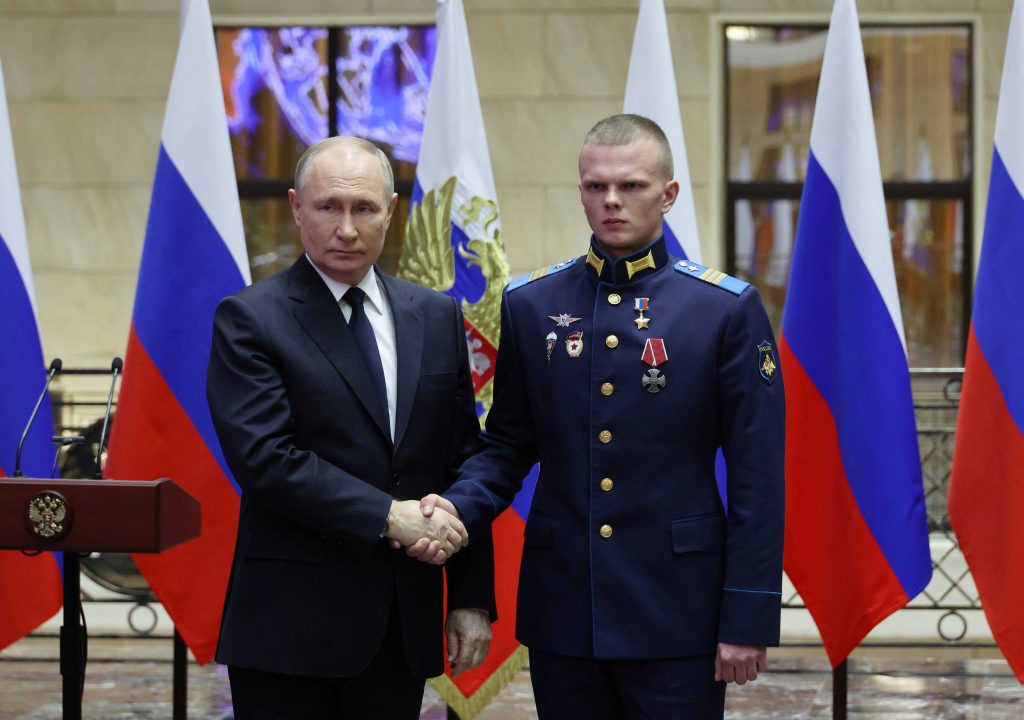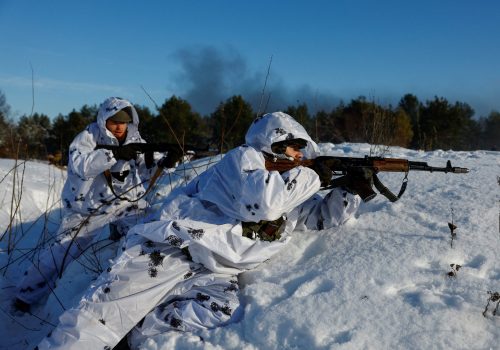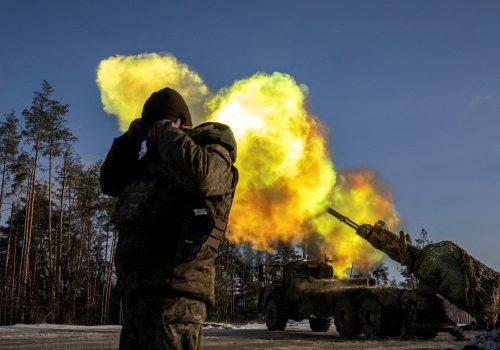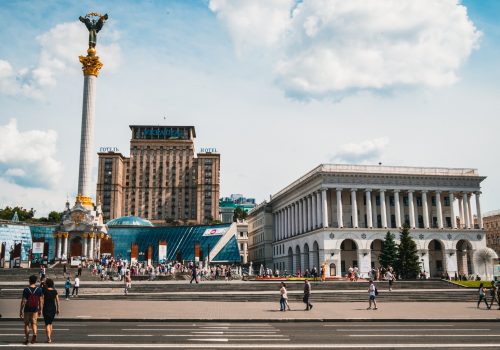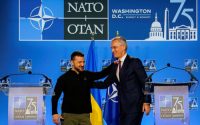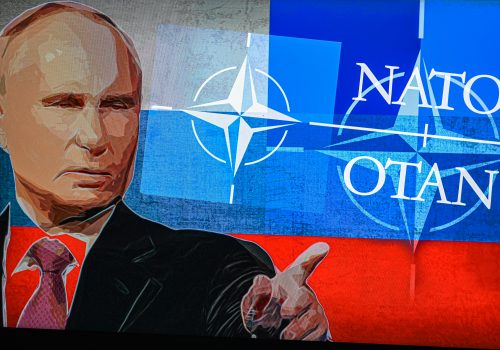
Putin scents historic victory amid growing signs of Western weakness
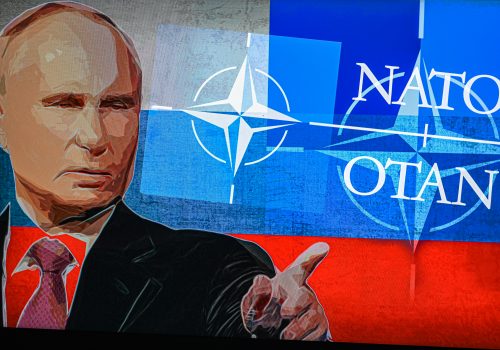
When Vladimir Putin canceled his traditional end-of-year marathon press conference last winter, it was widely interpreted as proof that the Russian invasion of Ukraine was going badly wrong. This December the flagship event was back, and so was the swagger. Putin oozed confidence throughout his carefully choreographed question-and-answer session, which lasted for more than four hours. In addition to claiming large parts of Ukraine as “historically Russian territory” and insisting Ukrainians are actually Russians (“one people”), the Kremlin dictator also made clear that he is in no mood to negotiate. “There will be peace when we have achieved all our goals,” he declared. “Victory will be ours.”
As the New Year holiday season draws near, this same upbeat message of impending victory is on display in public spaces across Russia, and is becoming increasingly prominent throughout the country’s Kremlin-controlled media ecosystem. “It’s difficult to overstate the level of outward confidence currently being displayed on Russian state TV,” commented Russian media watcher Francis Scarr of BBC Monitoring on December 20.
The growing sense of triumphalism inside Russia is all the more striking as it is largely unconnected to any developments on the battlefields of Ukraine. Indeed, Putin’s invading army has barely advanced at all during 2023, and has spent much of the past year on the defensive. Nevertheless, there is no mistaking the change in mood among the Russian elite compared to the gloomy outlook of late 2022. This renewed faith in ultimate Russian victory owes much more to Western weakness than to the Kremlin’s own military might.
Stay updated
As the world watches the Russian invasion of Ukraine unfold, UkraineAlert delivers the best Atlantic Council expert insight and analysis on Ukraine twice a week directly to your inbox.
Since the early stages of this year’s summer campaigning season, international coverage of the war has focused almost exclusively on Ukraine’s failing counteroffensive. This has obscured the fact that Russia’s own attempted offensives have proven equally underwhelming. Despite mobilizing more than 300,000 additional troops in late 2022, Moscow has been unable to achieve any major military breakthroughs over the past twelve months. Instead, the front lines of the war have remained largely static, with Russian commanders paying a terrible price in men and equipment for comparatively modest gains that have often been measured in meters rather than kilometers.
The absence of international media interest in Russia’s lack of progress speaks volumes about the country’s diminished status as a military superpower. On the eve of the full-scale invasion, many experts believed Ukraine would be no match for Putin’s army and predicted the country would fall in a matter of days. Less than two years later, Russia’s multiple failed offensives and catastrophic losses are now increasingly taken for granted. Rarely in modern history has a country’s military reputation taken so severe a battering in such a short space of time.
While the Russian army has little to cheer, the situation at sea is arguably even worse. The Russian Black Sea Fleet’s shortcomings first became apparent in the early months of the war with the sinking of fleet flagship The Moskva and the retreat from Snake Island. However, these setbacks were to prove relatively minor compared to the fleet’s dramatically deteriorating fortunes during 2023. Despite not having a navy of its own, Ukraine has used a combination of drones, missiles, and commando raids over the past year to break the blockade of the country’s Black Sea ports and force Russia to withdraw the bulk of its warships from occupied Crimea. The most humiliating blow in this innovative Ukrainian campaign came in September, when the headquarters of the Russian Black Sea Fleet in Sevastopol was partially destroyed by a Ukrainian airstrike.
Eurasia Center events

With 2023 offering very little in terms of genuine Russian military success stories, why is the Kremlin suddenly so bullish about the future prospects of the invasion? This optimism is in large part due to a weakening of Western resolve that has become increasingly evident during the second half of the year. The failure of Ukraine’s counteroffensive has played a key role in this process, leading to widespread war weariness and increased talk of “Ukraine fatigue.” With no end in sight to the conflict, a major new American support package has become hostage to domestic US politics, while EU leaders were recently unable to secure unanimous support for a landmark multi-year aid initiative.
Western weakness is playing directly into Putin’s hands. Ever since the failure of its initial blitzkrieg attack in spring 2022, Russia’s strategy has been to outlast the West while gradually overwhelming Ukraine. Putin is openly preparing his country for an extended confrontation with the Western world, and has shifted the Russian economy to a war footing. This long-term approach appears to be working. Many in Russia are now convinced the West is preparing to abandon Ukraine and are openly relishing the prospect of what would be an historic victory.
As the world prepares to enter 2024, the stakes in Ukraine could hardly be higher. If Western indecision and disunity allows Putin to achieve his goal of extinguishing Ukrainian statehood, the implications for international security would be disastrous. A resurgent Russia would almost certainly go further, either by targeting low-hanging fruit such as Moldova and Kazakhstan, or by testing NATO itself. Even in a best case scenario, the countries of the democratic world would soon find themselves forced to drastically increase defense budgets to levels that would dwarf the current cost of arming Ukraine. Meanwhile, other authoritarian regimes would seek to replicate Russia’s success. The whole world would be plunged into a new era of instability.
If Western leaders wish to prevent the collapse of the international security system, they must recognize the necessity of defeating Putin and finally give Ukraine the tools it needs to secure victory. There is nothing inevitable about the current stalemate; on the contrary, it is a direct result of the failure to arm Ukraine adequately in 2023. With sufficient weapons, Ukraine has already shown it is capable of beating Russia on the battlefield. However, without continued Western support, Ukrainian resistance will likely end in tragedy.
Fateful months lie ahead. The collective West has more than enough economic, industrial, and military resources at its disposal to surpass anything Russia could hope to muster, but Western leaders have yet to demonstrate the necessary political will to win. Unless this is urgently rectified, 2024 may go down in history as a decisive year not only for Ukraine but for the entire Western world.
Peter Dickinson is editor of the Atlantic Council’s UkraineAlert service.
Further reading
The views expressed in UkraineAlert are solely those of the authors and do not necessarily reflect the views of the Atlantic Council, its staff, or its supporters.

The Eurasia Center’s mission is to enhance transatlantic cooperation in promoting stability, democratic values and prosperity in Eurasia, from Eastern Europe and Turkey in the West to the Caucasus, Russia and Central Asia in the East.
Follow us on social media
and support our work
Image: Russian President Vladimir Putin awards Sergeant Yevgeny Supakov with the Hero of Russia Gold Star medal following an expanded meeting of the Defence Ministry Board at the National Defence Control Centre in Moscow, Russia December 19, 2023. (Sputnik/Mikhail Klimentyev/Kremlin via REUTERS)
